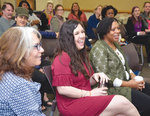

A program called the Family Acceptance Project aims to help ethnically and religiously diverse families support their Lesbian, Gay, Bisexual, Transgender, Queer (LGBTQ+) children in the context of their family, culture and faith communities.
The program, which is the first of its kind in North Carolina, is made possible by a grant given by Cardinal Innovations, a managed care organization in North Carolina, to North Carolina Families United, a non-profit that focuses on the mental health of children.
The program will culminate in a two-day event in Alamance County on May 7-8. Leading up to the conference, professionals from Cardinal Innovations and NC Families United have been holding primers in three counties, including one held at the Chatham County Community Library last week, to introduce school system, non-profit, and health professionals to the program and provide a basic knowledge of how to engage and interact with LGBTQ+ youth.
“This type of programming is important because it works to create a safe and open space for dialogue to occur regarding ways to improve the health and wellbeing of all of our youth — not just LGBTQ+ youth,” said Erich Priest, social worker at Freedom House Recovery in Chapel Hill and a presenter at the Chatham County event. “If any one group is left out of these conversations then they all suffer as a result. For me the aim is to provide research, resources, and opportunities for communities to discuss how to grow and support each other regardless of sexual orientation, gender identity, and/or gender expression.”
“A lot of times, people don’t know how to approach the LGBTQ+ community,” said Chandrika Brown of NC Families United. “It’s an opportunity to be educated by a trainer that knows the community so that they can better connect you the youth can feel acknowledged.”LGBTQ+ youth who do not feel accepted by their family or caregivers have a greater instance of negative health outcomes such as higher risks of HIV/AIDS, substance abuse, sexual assault, and homelessness, according to research.
“Gay and transgender teens who were highly rejected by their parents and caregivers were at very high risk for health and mental health problems when they become young adults (ages 21-25),” Researcher and Project Director for Family Acceptance Project Caitlin Ryan wrote. “Highly rejected young people were: More than eight times as likely to have attempted suicide, nearly six times as likely to report high levels of depression, more than three times as likely to use illegal drugs, and more than three times as likely to be at high risk for HIV and sexually transmitted diseases compared with gay and transgender young adults who were not at all or only rejected a little by their parents and caregivers — because of their gay or transgender identity.”
“Our main goal is to educate the community on the LGBTQ community and how to better interact with our youth,” Brown said. “To educate our families on engagement and acceptance. Our goal is not to change a persons thoughts or feelings on the subject but to teach on acceptance and respect.”
The Family Acceptance Project’s May event will bring together not only providers, families, youth, and school staff, but also pastors, youth pastors, youth leaders to focus on engagement.
“We have heard from parents, youth and caregivers on how difficult this is once the youth come out openly about their LGBTQ status,” Brown said. “There are other initiatives around the state I’m sure but what we have developed for our area is unique to what our community say they need.”
Attendees to the Chatham County event recognized the importance of the project and appreciated the opportunity to learn about engaging LGBTQ+ youth and educating their peers on the same.
“When working with any population (but especially with kids) it is always important to stay current, refresh one’s knowledge base,” said Erika Guy, a lifelong educator who currently volunteers in the counseling department at Chatham Middle School and with Chatham County Communities In Schools. “I am glad to see that efforts are being made to connect with this most vulnerable segment of the adolescent population.”
“I thought it was a great opportunity to reach more students/better serve a population that I am already working with,” Lorin Robison, school counseling intern in Chatham, said. “As a community I think there is always room for improvement on how we can better support the many needs that we see, especially within the school system. The event was informative and I hope to be able to go to the following events.”
“All youth should have the right to feel safe in their community and anything that we can do as community leaders/youth service agents to further that is important,” George Greger-Holt, Community Outreach Coordinator for Chatham Drug Free said. “I am concerned about the increased risk that LGBTQ+ youth have for substance use. By creating a safe community, LGBTQ+ youth will be less likely to turn to alcohol and other drugs for relief.”
“I was happy to see such a good turnout for the event and hopefully it will begin a dialog among youth serving agencies to develop a coordinated approach to supporting LGBTQ+ youth,” Greger-Holt said.